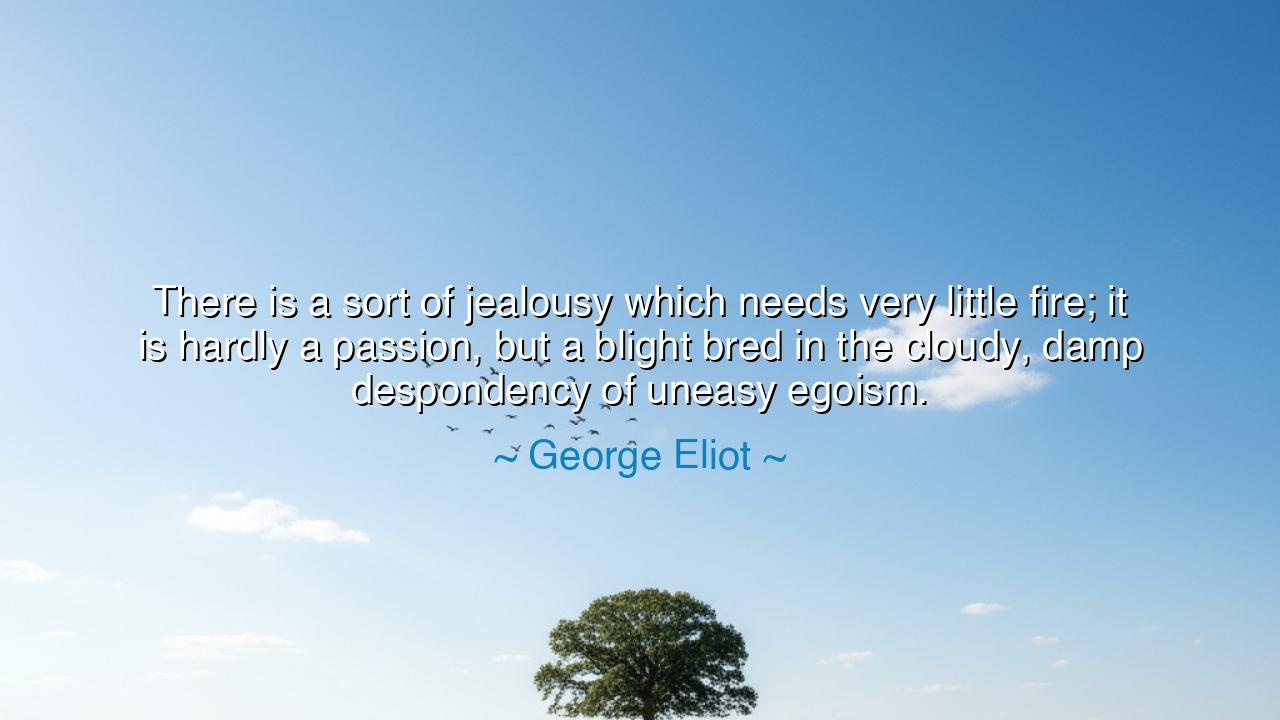
There is a sort of jealousy which needs very little fire; it is
There is a sort of jealousy which needs very little fire; it is hardly a passion, but a blight bred in the cloudy, damp despondency of uneasy egoism.






“There is a sort of jealousy which needs very little fire; it is hardly a passion, but a blight bred in the cloudy, damp despondency of uneasy egoism.” So wrote George Eliot, the wise and tender seer of the human heart, whose pen traced the hidden shadows of the soul with the precision of a surgeon and the compassion of a saint. In this line, she unveils one of the most subtle and poisonous forms of jealousy—not the fierce storm that burns bright and dies quickly, but the quiet, creeping mold that grows in the dim places of the heart. It is not born of love, nor of true passion, but of ego, of insecurity, of the small self that cannot bear the light of another’s greatness.
In the world of George Eliot, human beings are not villains or saints, but a mixture of both—complex, frail, yearning creatures. She saw that not all jealousy is fiery and grand like the rage of Othello or the envy of Cain. Some forms are softer, smaller, more insidious. This lesser jealousy is a blight—a disease of the spirit that takes root where the soul has grown damp with self-pity and gloom. It is the jealousy of comparison, of quiet resentment, of hearts that feel slighted though no wrong has been done to them. Such uneasy egoism, as she calls it, is the soil from which bitterness grows. It festers not from injustice, but from the inability to rejoice in another’s light.
We can see this truth in every age and every heart. Consider Salieri, the court composer of Vienna, whose story became legend through the tale of Mozart. Salieri served faithfully, worked diligently, and longed for divine inspiration. But when Mozart’s effortless genius appeared, something within him turned sour. His jealousy was not the roaring flame of hatred, but the cold, slow blight of wounded pride. He did not hate Mozart for wrongdoing—he envied him for brilliance. His despair, like a fog, smothered his joy and corroded his peace. In Salieri’s heart, as in Eliot’s words, we see that the deadliest jealousy is not violent, but sorrowful; not passionate, but damp with despondency.
This is the kind of jealousy that needs “very little fire.” It does not erupt in violence, yet it poisons friendships, corrodes love, and sours the taste of happiness. It whispers, not shouts; it lingers in the corners of conversation and the silence of comparison. It can live in anyone—a friend who sees another’s success, a lover who feels replaced, a scholar who beholds a greater mind. It does not destroy through passion, but through paralysis. The one who harbors it does not strike; they wither. For this jealousy feeds not on the faults of others, but on the frailty of one’s own ego.
Eliot’s genius lay in seeing that this disease is not simply moral failure, but a form of sorrow — a despondency born from misunderstanding the self. When a man or woman ties their worth to comparison, when they measure joy against another’s triumph, they plant seeds of decay in their own heart. The uneasy ego cannot celebrate another’s success because it fears it reflects its own smallness. It hides beneath humility, yet it is pride disguised as pain. The cure is not punishment, but awakening — to remember that the soul’s true worth is not in competition, but in creation, not in envy, but in understanding.
We see this awakening in those who transform envy into admiration. When Michelangelo praised the sculptures of Donatello, when Beethoven revered the works of Haydn, they proved that greatness begets greatness, and that a humble spirit sees in another’s brilliance not a threat, but an invitation to rise higher. True strength rejoices in the light of others, for it knows its own flame will not dim because another shines. The wise do not compare, for they know that every soul is a unique expression of the divine.
So, my listener, take this lesson from the wisdom of George Eliot: beware not only the roaring jealousy that burns, but the quiet one that rots. Guard your heart against uneasy egoism, the damp fog that dims your spirit. When you feel envy stirring, ask not, “Why them?” but “What can I learn?” Praise others where once you would have compared. Turn despondency into gratitude, and ego into growth. For the truest freedom lies in admiring without envy, in striving without bitterness, and in loving without fear.
Thus, remember: the jealous heart is a prison built by the self. But the soul that learns to celebrate others has torn down its walls and walks freely in the open fields of joy. Be such a soul. Dry the damp places of your spirit with light and humility. For in that clarity, jealousy ceases, and the heart, once troubled, blooms again in peace.






AAdministratorAdministrator
Welcome, honored guests. Please leave a comment, we will respond soon